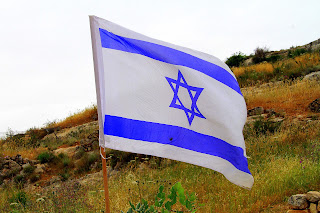Not terribly exciting stuff you might think except that the workshop and office are located at the edge of Ramle's bustling shuk, a warren of old alleys, historic buildings, derelict buildings and a general feeling of Israel as it was 30 or more years ago, as though time has stood still.
The towns of Ramle and Lod are home to a substantial Indian Jewish community, and Israeli-Indian singer Liora Yitzhak filmed the video clip for her recent single "Ma'ala Ma'ala" at the colourful Ramle-Lod market. Wending our way through the Friday crowds with her Bollywood inspired routines playing in my mind's eye I half expected folks to erupt in song and dance at any moment.
Reaching the workshop we were instead greeted by the most beautiful Yemeni Hebrew singing of prayers for the High Holy Days rising above row after row of neatly stacked slabs of shiny granite and the din of powerful industrial strength fans and tools. On the factory floor, covered in white stone dust from kipa to shoes, stood the chief stone mason, practicing his Yom Kippur davening while cutting counter tops. If he ever records an album I will be first in line to buy it, truly an amazing voice.
Our business concluded he and the sales woman in the office sent us on our way with a plethora of blessings for the New Year, smiles and kisses for our babies and more delightful singing.
Out in the shuk again preparations for the coming holidays were in full swing. I started thinking of Liora Yitzhak's song again, with it's focus on starting afresh, maybe it's the time of year, maybe it's just the out of left field way my mind works, but somehow it always makes me think of the Yom Kippur hymn "Ya'aleh Tahnuneinu", about our prayers ascending to Heaven.
May all our prayers breach the gates of Heaven, may we all be blessed with a year of positive new beginnings, good health and creative energy. Gmar hatima tova. May we all be inscribed in the book of life and all good things.
Reaching the workshop we were instead greeted by the most beautiful Yemeni Hebrew singing of prayers for the High Holy Days rising above row after row of neatly stacked slabs of shiny granite and the din of powerful industrial strength fans and tools. On the factory floor, covered in white stone dust from kipa to shoes, stood the chief stone mason, practicing his Yom Kippur davening while cutting counter tops. If he ever records an album I will be first in line to buy it, truly an amazing voice.
Our business concluded he and the sales woman in the office sent us on our way with a plethora of blessings for the New Year, smiles and kisses for our babies and more delightful singing.
Out in the shuk again preparations for the coming holidays were in full swing. I started thinking of Liora Yitzhak's song again, with it's focus on starting afresh, maybe it's the time of year, maybe it's just the out of left field way my mind works, but somehow it always makes me think of the Yom Kippur hymn "Ya'aleh Tahnuneinu", about our prayers ascending to Heaven.
May all our prayers breach the gates of Heaven, may we all be blessed with a year of positive new beginnings, good health and creative energy. Gmar hatima tova. May we all be inscribed in the book of life and all good things.













